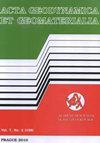The Barzavand and Neysian Copper Deposits, NW Naein, Central Iran zone: Constraints on styles mineralization and geochemical signatures of hydrothermal alterations.
IF 0.9
4区 地球科学
Q4 GEOCHEMISTRY & GEOPHYSICS
引用次数: 0
Abstract
Field observations in the northwest of Naein (Central Iran zone) indicate various types of alteration products have extended into pyroclastic and volcanic units with Oligomiocene age. It seems the Zefreh (with NWSE trend) and Kachumesqal (with E-W trend) faults are effective factors in the formation of Neysian and Barzavand copper deposits respectively. Alteration in Barzavand copper deposit (with stratabound form) includes pyritization, propylitization, zeolitization, saussuritization, uralitization and silicification, while in Neysian (with oval form) include phyllic, advanced argillic, argillic and propylitic. Geochemical studies in Barzavand show the positive correlation between (La/Lu)N, (La/Yb)N and (La/Sm)N and CaO (r= 0.70 to 0.96) related to propylitization of host rock basalt and increase in pH of fluids responsible for mineralization that play important role in differentiation of lanthanides in study area. The Barzavand copper deposit has submarine volcanism, diagenesis, burial metamorphism and weathering stages during its evolution. Remarkable geochemical features in Neysian include high (La/Lu)N, Ba and Sr values than La, Ce and Y. It seems that extensive alteration occurred along with hypogene and supergene processes in Neysian. According to alteration properties, mineralogy and the whole-rock geochemistry, the Barzavand and Neysian copper deposits are most similar to Mantotype and porphyry copper deposits respectively. ARTICLE INFO伊朗中部NW奈因地区Barzavand和Neysian铜矿:热液蚀变的样式、成矿约束和地球化学特征。
Naein西北部(伊朗中部地区)的现场观测表明,各种类型的蚀变产物已扩展到渐新世的火山碎屑和火山单元中。Zefreh(NWSE走向)和Kachumsqal(E-W走向)断层似乎分别是Neysian和Barzavand铜矿床形成的有效因素。Barzavand铜矿(层控型)的蚀变包括黄铁矿化、丙基化、沸石化、硫铁矿化、乌拉尔石化和硅化,而Neysian铜矿(椭圆形)的蚀蚀变包括千枚状、晚期泥质、泥质和丙基化。Barzavand的地球化学研究表明,(La/Lu)N、(La/Yb)N和(La/Sm)N与CaO呈正相关(r=0.70-0.96),这与寄主岩石玄武岩的丙基化和负责矿化的流体pH值的增加有关,这些流体在研究区镧系元素的分异中起着重要作用。Barzavand铜矿床在演化过程中经历了海底火山作用、成岩作用、埋藏变质作用和风化作用阶段。Neysian显著的地球化学特征包括比La、Ce和Y高的(La/Lu)N、Ba和Sr值。Neysian似乎伴随着深生和浅生过程发生了广泛的蚀变。根据蚀变性质、矿物学和全岩地球化学特征,Barzavand铜矿和Neysian铜矿分别与地幔型和斑岩型铜矿最为相似。文章信息
本文章由计算机程序翻译,如有差异,请以英文原文为准。
求助全文
约1分钟内获得全文
求助全文
来源期刊

Acta Geodynamica et Geomaterialia
地学-地球化学与地球物理
CiteScore
2.30
自引率
0.00%
发文量
12
期刊介绍:
Acta geodynamica et geomaterialia (AGG) has been published by the Institute of Rock Structures and Mechanics, Czech Academy of Sciences since 2004, formerly known as Acta Montana published from the beginning of sixties till 2003. Approximately 40 articles per year in four issues are published, covering observations related to central Europe and new theoretical developments and interpretations in these disciplines. It is possible to publish occasionally research articles from other regions of the world, only if they present substantial advance in methodological or theoretical development with worldwide impact. The Board of Editors is international in representation.
 求助内容:
求助内容: 应助结果提醒方式:
应助结果提醒方式:


